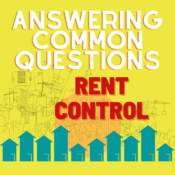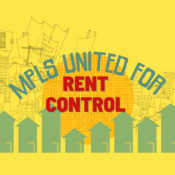Minneapolis Needs Strong Rent Control
We need a strong Rent Control policy – Free from corporate loopholes, covering ALL renters, and tying rent increases to the cost of living.
Read Our Six Point Proposal For Minneapolis!
TOGETHER WE WILL …
Tie annual rent increases to inflation (2.3% per year) or the Consumer Price Index (3% per year).
TOGETHER WE WILL …
Apply to all properties that have obtained a rental license, regardless of the size of the building or the year it was constructed.
TOGETHER WE WILL …
Include protections against the amounts landlords can pass renovation and repair fees onto tenants.
TOGETHER WE WILL …
Apply to the home, rather than the tenant, to avoid price-hikes when people move out.
TOGETHER WE WILL …
Retroactively apply this to rental prices a year before rent control is implemented to avoid price gouging.
TOGETHER WE WILL …
Ensure it would be enforced by a well-resourced Renter Protection Board that empowers renters.
Sign and Share the Petition!
Minneapolis United for Rent Control

Answering Common
Questions About Rent Control.
Corporate landlords and big developers will spread lots of misinformation about Rent Control. Take a few minutes to learn more!
Minneapolis United for Rent Control is endorsed by numerous organizations, including:
The Harrison Neighborhood Association, Socialist Alternative, the Minnesota Nurses Association (MNA), Amalgamated Transit Union Local 1005 (ATU 1005), Corcoran Neighborhood Organization, Minnesota Association of Professional Employees (MAPE), Minneapolis Federation of Teachers and Educational Support Professionals (MFT 59), Unite HERE Local 17, CAIR-MN, the Restaurant Opportunities Center – MN, Black Visions, Reclaim the Block, Cedar Riverside Community Council, Seward Neighborhood Group, Ayada Leads, Twin Cities Democratic Socialists of America (TC-DSA), Shiloh Temple International Ministries, The Minnesota State Baptist Convention, and numerous other faith-based organizations.
01 | HASN’T RENT CONTROL CAUSED RENTS TO SKYROCKET IN NEW YORK CITY AND SAN FRANCISCO?
Contrary to popular myth, rent control in NYC and San Francisco – or any other city that has had it – has been a veritable lifeline for the many tenants who would have been completely priced out of the city.
The problem is rent control policies in these cities have been riddled with developer-friendly loopholes over the years. For example, in New York City, “vacancy decontrol” erodes rent controlled units over time, making it harder to access affordable housing.
The problem facing rent-controlled cities in California is not rent control, but the destructive statewide Costa-Hawkins Act of 1995, by Democratic Senator Jim Costa and Republican Assemblymember Phil Hawkins, which introduced insidious corporate loopholes and strangled California cities from passing strong rent control laws.


02 | WON’T DEVELOPERS STOP BUILDING MORE HOUSING?
The claim that rent control reduces the quality and quantity of available housing is a myth perpetuated by the real estate lobby. Rent control will be no more responsible for developers halting building than will a higher minimum wage cause job losses.
New York City’s two largest building booms took place during times of strict rent controls: the 1920s and the post-war period between 194 7 and 1965.”
More recently, UC Berkeley researchers have found that “the six cities that had rent control in the Bay Area actually produced more housing units per capita than cities without rent control.”
Which means, not that rent control caused more development, but that rent control did not prevent new construction.
03 | WHAT IF A TENANT MOVES OUT?
This is why rent control needs to be applied city-wide to all housing units, and not include developer-friendly loopholes like “vacancy decontrol”, which allow landlords to raise the rent after a tenant leaves a rent-controlled apartment, charging whatever they want to the next tenant.
Since ”vacancy decontrol” was passed in New York City, the number of rent controlled units has fallen f ram 1 million to 43,000 in 2006, and has continued to fall since.
By contrast, vacancy controlled homes remain rent-controlled in between tenants, even if a tenant vacates of their own volition.


04 | DON'T LANDLORDS NEED TO MAKE MONEY?
Small landlords who charge rent to maintain a property don’t typically raise rents like corporate developers who see housing as for-profit investment.
Sightline, a housing journal for real-estate investors explains this from the profiteer’s standpoint: “The rule is simple: the rent pays for everything [interest to the banks and lenders, land, construction, operations expenses]. Investors and lenders won’t put money [unless they get a sizable profit rate, like at least 5.8%]. It follows that the rent [is total] cost multiplied by 5.8 percent.”
Sightline goes on to point out that if real estate investors were willing to accept a lower profit margin, like 2 percent, rents could be cut in half!
05 | SHOULD SMALL APARTMENT BUILDINGS AND DUPLEXES BE EXEMPTED?
Minneapolis should find ways to support small landlords without penalizing cost-burdened renters by including exemptions for small buildings.
While corporate landlords have the up-front cash to build and buy large buildings, the idea that renters who live in single family homes pay rent to small landlords is false. Since the 2008 financial crisis, Wall Street has invested over $60 billion into buying hundreds of thousands of foreclosed homes across the country.
In Minneapolis, Havenbrook Properties, a Georgia-based Wall Street investment shell company, owns 152 single family rental homes in the Camden neighborhood, a sizable fraction of the neighborhood.
Minneapolis should find other ways to support small landlords rather than relying on cost-burdened tenants to subsidize them.


06 | WHAT ABOUT OTHER WORKING CLASS SUBURBS AND RENTERS ACROSS THE STATE?
All renters should be protected against out of control rent increases, but in cities like Minneapolis where the housing crisis is most acute, we should lead the way and put pressure on higher government.
For example, look at how the $15/hr minimum wage developed. When low-wage workers first went on strike demanding $15, many though it was impossible.
Then cities across the country spearheaded passing a $15/hr minimum wage, including Minneapolis and St. Paul, and now present-elect Joe Biden is talking about it federally.
We need to pass rent control where we can right now, and then keep up the pressure to pass it at broader levels of government.
Minneapolis United for Rent Control

Join Us! Volunteer !
Stay Involved and Build the Movement !
When you ‘Sign the Petition’, tell us how you want to stay involved! You can also contact the team by using the ‘live chat’ tab on this page, emailing us, or giving us a call! We are also available on social media!
Please get involved today!
T: 651-216-8890
(Google Number, please leave message)

